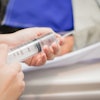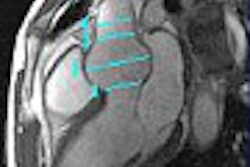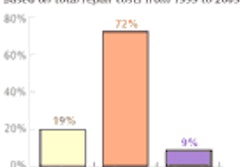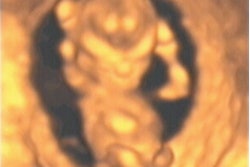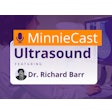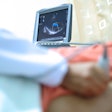(Ultrasound Review) A combination of biochemical markers and fetal ultrasound should prove more effective for screening for Down syndrome than either approach separately.
Researchers at the Center for Perinatal Studies, Swedish Medical Center in Seattle tested this hypothesis, which was detailed in Journal of Ultrasound in Medicine. Dr. Vivienne Souter and colleagues investigated the correlation between second trimester soft ultrasound markers and biochemical markers in predicting Down syndrome.
They evaluated 2,183 women with normal singleton fetuses who had second-trimester ultrasound imaging between 14-22 weeks and maternal serum biochemical testing (human chorionic gonadotrophin, -fetoprotein, and estriol). Sonographic soft markers included, "nuchal fold thickness, humerus length, femur length, renal pyelectasis, hyperechoic bowel, echogenic intracardiac focus, and choroid plexus cysts."
A weak negative, but statistically significant, correlation was found between human chorionic gonadotropin and both femur and humerus length. No significant correlation was found between nuchal fold thickness and any biochemical marker at the 1% level.
However, at the 5% level the median human chorionic gonadotropin level was lower when a heart echogenic focus was demonstrated. At the 5% level, hyperechoic bowel was associated with higher median human chorionic gonadotropin and -fetoprotein levels.
"Sonographic and biochemical markers for trisomy 21 are largely independent in unaffected pregnancies," the authors wrote. They recommended correlation in both affected and unaffected pregnancies for accurate risk estimation.
"There is good reason to believe that the combination of maternal serum biochemical markers and fetal sonography provides more effective screening for Down syndrome than either approach alone," they concluded.
However, they cautioned that with so few studies correlating second-trimester markers and biochemical markers, "there is continued uncertainty as to whether second-trimester sonographic and biochemical markers are independent of each other and how results from these two screening modalities should be integrated."
Correlation of second-trimester sonographic and biochemical markersVivienne L. Souter, et. al.
Center for Perinatal Studies, Swedish Medical Center, Seattle.
J Ultrasound Med 2004 April; 23:505-511
By Ultrasound Review
May 24, 2004
Copyright © 2004 AuntMinnie.com



